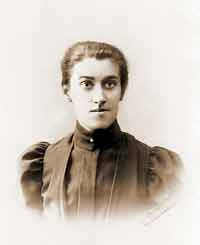Olga Antonovna Dobiash-Roshdestvenskaya
Olga Antonovna Dobiasch-Roschdestwenskaja ( Russian Ольга Антоновна Добиаш-Рождественская ; born May 19 . Jul / 31 May 1874 greg. In Kharkov , † thirtieth August 1939 in the village Isori in Volosovo in the Leningrad Oblast ) was a Russian historian , medievalist and university professor .
Life
Olga Dobiasch, daughter of the history teacher Anton W. Dobiasch of Czech origin , graduated from the Neschin girls' high school in 1891 with a gold medal. Because of her poor health, her parents did not allow her to study in the Higher Bestushevsky courses for women in St. Petersburg until 1895 . In 1899 she was excluded from the courses for participating in student unrest in connection with the suicide of course participant MW Wetrowa and briefly imprisoned in the Peter and Paul Fortress . For the next three years she gave private lessons because she was banned from teaching in state institutions. Only then was she allowed to teach at state high schools. She also taught at workers' Sunday schools. 1904–1906 she was secretary of the All-Russian Union of Teachers. In 1907 she became a lecturer (1916 professor) in the Bestuschewski courses at the invitation of her teacher IM Greaves .
In 1908, Olga Dobiasch married the physicist Ilya Roschdestwenski . In the same year, on Greave's recommendation, she was sent to Paris to study at the École nationale des chartes in the Sorbonne . There she wrote her dissertation La vie paroissiale en France au XIII-e siècle ďaprès les actes episcopaux , with which she received her doctorate from the University of Paris in 1911 . After her return she taught at the University of St. Petersburg . The focus of her research and teaching was the Western European Middle Ages , with a particular focus on the Crusades . In 1915 she successfully defended her Russian master’s dissertation The Church in France in the 13th Century , which was based on her French dissertation in 1911. This made her the first woman in Russia to receive a master's degree in general history. From late 1916 to mid-1917 she was with the Cadets , which is why she was imprisoned from August to September 1919 after the October Revolution .
After the October Revolution, Dobiasch-Roshdestvenskaya was the first woman to be awarded her dissertation The Cult of St. Michael in the Latin Middle Ages in 1918 . Century of Doctor in History awarded. She then became professor for life at the University of Petrograd and Leningrad and in 1929 became the first woman to be a corresponding member of the Academy of Sciences of the USSR (AN-SSSR) . In addition, she worked in the manuscript department of the Russian National Library from 1922 until her death .
Dobiash-Roshdestvenskaya was buried in Leningrad's Volkovo Cemetery at the literary bridges. The physicist Alexander Dobiasch was her brother.
Individual evidence
- ↑ a b c d e f g Т. П. Воронова: Сотрудники РНБ - деятели науки и культуры, Биографический словарь, т. 1–4 (accessed January 6, 2017).
- ↑ a b c Е. А. Косминский: Изучение истории западного средневековья . In: Вестник АН СССР. - Наука . No. 10 , 1945, p. 43 .
- ↑ Добиаш-Рождественская Ольга Антоновна: Культ Св.Михаила в латинском средневековье V — VIII вв . 1917.
- ↑ RAN: Добиаш-Рожденственская Ольга Антоновна (accessed January 6, 2017).
| personal data | |
|---|---|
| SURNAME | Dobiasch-Roshdestvenskaya, Olga Antonovna |
| ALTERNATIVE NAMES | Добиаш-Рождественская, Ольга Антоновна (Russian); Dobiash-Rozhdestvenskaia, Olga Antonovna; Dobiache-Rojdestvensky, Olga Antonovna |
| BRIEF DESCRIPTION | Russian historian and university professor |
| DATE OF BIRTH | May 31, 1874 |
| PLACE OF BIRTH | Kharkov |
| DATE OF DEATH | August 30, 1939 |
| Place of death | Isori near Volosovo |
